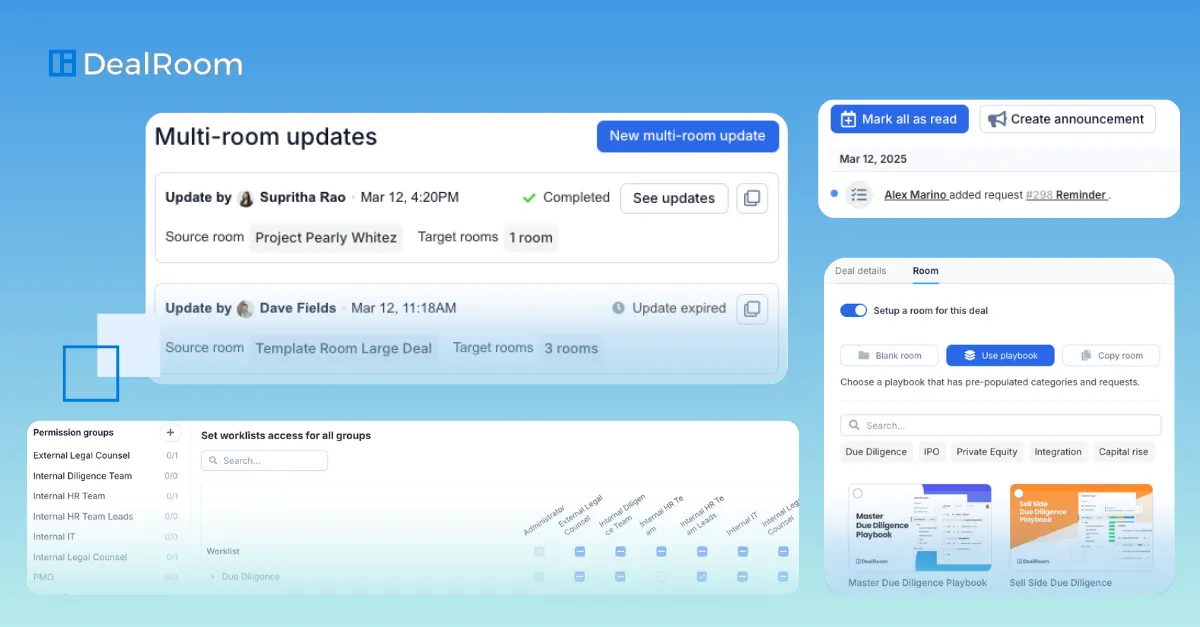If 2020 was the year that showed that M&A activity is highly resilient to almost any economic setbacks, 2021 proved that it will always rebound to new levels after recovering from those setbacks. McKinsey found M&A deals in 2021 have set new unseen records for global M&A activity.
This surge in activity was repeated for many M&A practitioners that use DealRoom for its M&A deal management services.
Below, we look at some of the recent biggest m&a deals of 2021, all of which we feel are likely to have significant implications for their respective industries in the years ahead.
See also: recent mergers and acquisitions and upcoming M&A deals.
List of the Biggest Mergers and Acquisitions Deals in 2021
- US$30 billion acquisition of KCS by Canadian National Railway
- US26 billion acquisition of Shaw Communication by Rogers Communication
- US$22 billion acquisition of Deutsche Wohnen by Vonovia
- US20 billion acquisition of Nuance Corporation by Microsoft
- US17.4 billion acquisition of PPD by Thermo Fisher Scientific Inc.
- US8 billion acquisition of William Grace by Humana
- US8 billion acquisition of MGM Studios by Amazon
Here are some of the largest M&A deals of 2021 in more detail:
1. US$30 billion acquisition of KCS by Canadian National Railway
The biggest M&A deal of 2021 may end up not being a deal at all if the antitrust legislators decide that this transaction works against competition in the United States.
The more you read about the CEO of CN talking up how the deal generates competition, the more you begin to think it’s a case for antitrust.
The combined firm would bring an integrated logistics firm that spans Canada, the United States, and Mexico, potentially perfectly timed for reset trade relations between the US and Mexico.
2. US26 billion acquisition of Shaw Communication by Rogers Communication
On the subject of monopolies…
The acquisition of Shaw Communication by Rogers creates a national behemoth in Canadian mobile communications.
Perhaps as a sop to regulators, the combined company has already committed to investing $2.5 billion in 5G infrastructure across Western Canada over the next half decade.
On the other side, it has also seen plenty of opposition from consumer groups, who allege (with some justification) that it pangs of a bad deal for Canadian telecoms consumers.
3. US$22 billion acquisition of Deutsche Wohnen by Vonovia
Maybe 2021 will be seen as the year of the anti monopoly regulators waving a white flag. In May, the largest residential property group in Germany made a play for the second largest.
In 2021, the deal is still the biggest m&a deal in Europe. When combined, the new firm will control more than 500,000 properties.
Vonovia had been eyeing up a takeover of its rival for several years and had previously had two offers rejected. Third time appears lucky, depending on what Germany regulators make of the deal.
4. US20 billion acquisition of Nuance Corporation by Microsoft
Microsoft’s $20 billion acquisition of Nuance Corporation gives it a large footprint in healthcare.
According to details of the deal released by Microsoft, the target company’s solutions are used by more than 55% of physicians, and 75% of radiologists in the US, and used in 77% of US hospitals.
It therefore represents an excellent acquisition for Microsoft Cloud for Healthcare, introduced in 2020, and Microsoft’s attempt to bring its industry-specific cloud strategy to the healthcare sector. It paid a 23% premium on the Nuance share price.
5. US17.4 billion acquisition of PPD by Thermo Fisher Scientific Inc.
This deal brings together a leader in scientific instrumentation, reagents and consumables, and software and services (Thermo Fisher Scientific) with a leader in clinical research services (PPD).
The deal is expected to generate in the region of $125 million in synergies. It also gives Thermo Fisher Scientific Industries a foothold in the $50 billion clinical research industry.
The acquisition should allow the company to provide a fuller range of services to its clients in areas such as pharmaceuticals and life sciences. It paid a 24% premium on the PPD share price.
6. US8 billion acquisition of William Grace by Humana
Humana already owned 40% of William Grace through its acquisition of the company in partnership with private equity firms TPG Capital and WCS in 2018. This deal represents its buying out of the remaining 60% of the shares of William Grace.
It will also see the new company rebranding as “CenterWell Home Health,” an extension of its payer-agnostic health care services brand, CenterWell. At this stage, it looks as though the big winners from this deal may be TPG Capital and WCS.
7. US8 billion acquisition of MGM Studios by Amazon
It’s never easy to pin down Amazon’s acquisition strategy. Between acquisitions of the Washington Post one minute, and Whole Foods the next, mixed with some acquisitions in drone companies along the way, it’s fair to say it’s a mixed bag.
The 2021 acquisition of MGM Studios looks like it could be a play for Amazon Prime Content - allowing the company to generate spin offs of its existing titles.
These include the franchises for James Bond and Rocky, both potentially highly lucrative on their own. Like several other deals on this list, however, the deal still requires government approval, so it’s unclear whether it will ever close.
Read also:
Successful and Failed Mergers and Acquisitions to Learn From

Here we also list the biggest M&A deals from 2020.
List of The Biggest M&A Deals in 2020
- US$30 billion acquisition of Willis Towers Watson by AON
- US$21 billion acquisition of Maxim Integrated by Analog Devices
- US$21 billion acquisition of Speedway gas stations by Seven and I
- US$18.5 billion acquisition of Livongo by Teladoc
- US$13 billion acquisition of E*Trade by Morgan Stanley
- US$7.3 billion acquisition of GrubHub by Just Eat
- US$6 billion acquisition of Credit Karma by Intuit
1. US$30 billion acquisition of Willis Towers Watson by AON
In the future, risk assessors may look back at 2020 as the year which defined the term, ‘black swan event’. But the year will also be notable for a different reason: the US$30 billion of Willis Towers Watson by AON - the insurance industry’s largest ever acquisition.
The combination, which should be confirmed in the first quarter of 2021, comes at a time when the insurance industry faces a range of new threats ranging from coronavirus in the short-term to climate change and cyber security in the long-term.
The all-stock deal makes AON (which the merged company will be called) the largest insurance broker in the world.
2. US$21 billion acquisition of Maxim Integrated by Analog Devices
Analog Devices is one of those companies that not everybody will have heard of, but one that they will all have come into contact with on a daily basis.
As the world’s largest manufacturer of semiconductors, Analog (as it’s more commonly referred to) produces the chips and electronics that power some of the most well-known products in the healthcare, automotive, industrial and consumer segments.
Its acquisition of Analog Devices - another all-share deal, reflecting the ongoing pandemic environment in which companies are hoarding cash - strengthens its position as the number one in its industry.
And with both companies specializing in different industries, the deal is expected to yield synergies of close to US$300 million.
3. US$21 billion acquisition of Speedway gas stations by Seven and I
During a year which has seen most people work at least a few months from home, reducing the need for transport, the idea of two gas station giants merging may seem like a strange one.
Seven and I, the Japanese owner of the ubiquitous 7-Eleven convenience stores, begged to differ: it says the acquisition of Marathon Petroleum’s Speedway gas stations allows it to tap into US economic and population growth at a time when Japan’s economy and population are moving in the opposite direction.
The deal also means that Seven and I will control more than 14,000 gas and convenience stores in North America.
The marketing segment of the oil and gas industry has traditionally been one of the most resilient, so don’t be surprised to see more consolidation of gas stations in the not-too-distant future.
4. US$18.5 billion acquisition of Livongo by Teladoc
Very few industries have managed to completely avoid the carnage wrought by the coronavirus pandemic. One such industry, which has not only managed to avoid the carnage, but thrive, is the telehealth industry.
The pandemic created a surge in demand for the services offered by companies like Livongo and Teladoc. Before the deal, each company was separately valued at US$8.5 billion, but the cash and stock deal creates a company valued post-transaction at US$18.5 billion.
Critics of the deal suggest that Teladoc has overpaid for Livongo and there may be big integration issues ahead for the two companies.
But those behind the deal are hoping that the new users of both services added during the pandemic represent a long-term shift in patient behaviour rather than just a short-time boost to revenue.
5. US$13 billion acquisition of E*Trade by Morgan Stanley
February 2020 seems like a long time ago for most people, given what has happened in the interim.
But cast your mind back and you may recall that February was the month in which investment bank Morgan Stanley acquired the world’s most popular online trading platform, E*Trade.
Retail investors are increasingly investing from their desktops, turning away from the traditional broker-dealer paradigm, so the deal was an obvious move by Morgan Stanley to gain a foothold in that market.
With approximately US$360 billion of retail client assets, the acquisition of E*Trade increases Morgan Stanley’s AUM by over 10%. And perhaps even more importantly, the deal nearly triples Morgan Staley’s client database from 3 million to 8.2 million.
6. US$7.3 billion acquisition of GrubHub by Just Eat
Up until Just Eat announced that it had acquired GrubHub in June 2020, it looked as though Uber was going to acquire America’s most popular food delivery company.
The last minute swoop by Just Eat means the company now has a large footprint in over 13 different countries and becomes the world’s largest food delivery company.
At the time of the acquisition, Just Eat announced that GrubHub had over 300,000 restaurants spread across 4,000 US cities. Although the deal creates a dominant name in food delivery, it’s difficult to see what the benefit from scale is for Just Eat.
Furthermore, 2020 was marked by strikes by gigging couriers across the world suggesting choppy waters ahead for the food delivery industry and possibly the gig industry as a whole.
7. US$6 billion acquisition of Credit Karma by Intuit
Intuit may be better known to most as the financial platform company behind popular software programs such as Turbo Tax, QuickBooks and Mint.
Although Intuit has a long history of acquisitions, this latest, all-cash transaction with Credit Karma, is the biggest by some distance.
From the outside, the deal looks like a winner. Intuit can add Credit Karma’s popular credit rating tools to its bundle to offer its clients a complete suit of personal finance tools.
Not to mention the fact that the deal creates a highly complementary dataset: What could make Credit Karma’s credit scores even more accurate? Direct access to people’s financials and tax returns.




.webp)















.png)
.webp)



.webp)
.webp)
.webp)





.png)
.png)
.png)
.svg)

.svg)
.png)
